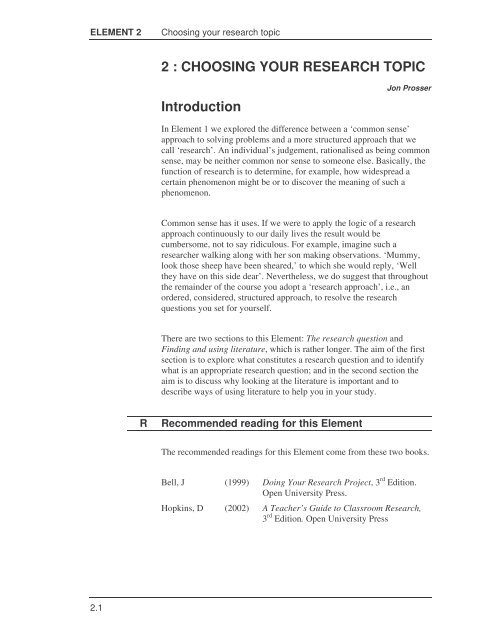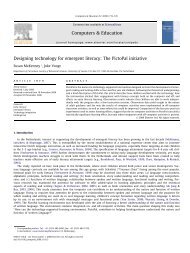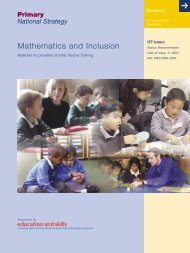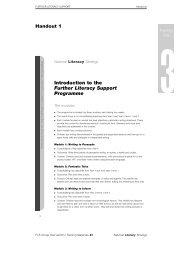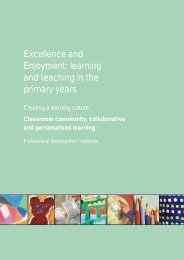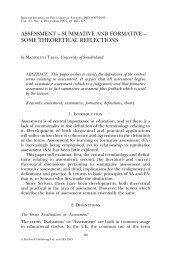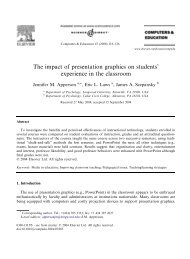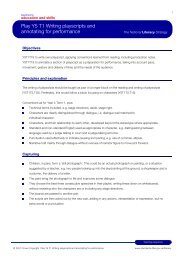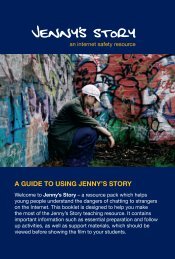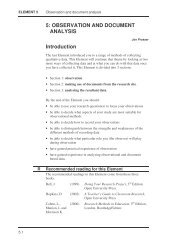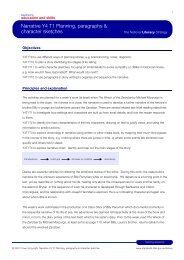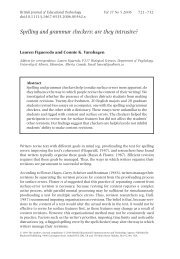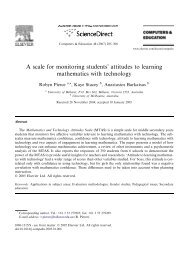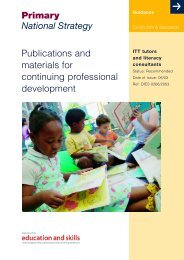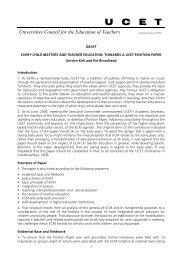Element 2 - Choosing your research topic by Jon Prosser.pdf - PGCE
Element 2 - Choosing your research topic by Jon Prosser.pdf - PGCE
Element 2 - Choosing your research topic by Jon Prosser.pdf - PGCE
You also want an ePaper? Increase the reach of your titles
YUMPU automatically turns print PDFs into web optimized ePapers that Google loves.
ELEMENT 2<strong>Choosing</strong> <strong>your</strong> <strong>research</strong> <strong>topic</strong>T Task 1About one hourConsider, Doing Your Research Project <strong>by</strong> Judith Bell (1999)Chapter 2 – ‘Planning the project’ – which discusses the <strong>topic</strong> of<strong>research</strong> questions in a little more depth. When you have finished,complete the task set out below.How do <strong>research</strong> questions help us? In the space below give tworeasons.Consider what sort of <strong>research</strong> <strong>topic</strong> you might want to explore. Inthe space below write, in no more than a short sentence, what that<strong>topic</strong> might be.See page 2.3 forexamples.Now be more specific about what you want to study. Try to focusdown on what it is in particular you want to <strong>research</strong> into. Thismay be one, two, three, four or more sentences. Write them in thespace below.Now try to formulate some focussed questions. Try to think interms of a limited range of issues central to <strong>your</strong> <strong>topic</strong>.Now look on the next page for the feedback on this task2.6
ELEMENT 2<strong>Choosing</strong> <strong>your</strong> <strong>research</strong> <strong>topic</strong>F Feedback on Task 11. The answer to this question is given in Section 1: Why do we need<strong>research</strong> questions?2. The <strong>topic</strong> you choose is <strong>your</strong> decision. Bear in mind the resourcesavailable to you and the sorts of issues that are important to you eithernow or in the near future. Avoid ‘philosophical’ questions andquestions which are so big that you will need an army of <strong>research</strong>ersto support you.3. No need to give intellectual answers here. Make pragmatic statementssuch as:• My boss has asked me to come up with answers to this problem.• I come across this issue quite often in my every day work.• It is an idea I have had for some time and this course is a way ofexploring it.You could then go on to explain that the study is feasible and will takex days’ work and that you have the resources to carry it out. Finally, ifyou have a hypothesis or have explored the literature in an area whichhas awoken <strong>your</strong> interest, describe this and how it will influence thestudy. This sort of information will give an indication of why thestudy is important to you and where the <strong>topic</strong> originates.4. Take time to think this through since it will influence the rest of <strong>your</strong>study. Make the questions tight enough to make data collectionfocussed and analysis manageable. Decide whether you want fairlyspecific answers to specific questions or a study which is lessfocussed initially and then progressively more focussed as you findout what is important and worth exploring further. A typical answerto this question might be:Title of the proposed study - ‘The induction of new teaching staff inChalfont School during 1995’. The study will consider the followingissues:• a brief history of the origins of induction programmes for new staffat the school• how the induction programme functions, particularly how it ismanaged and administered.• new teachers’ perceptions of the induction programme• teachers’, managers’ and administrators’ perceptions of theprogramme• how efficient and effective the induction programme is.2.7
ELEMENT 2<strong>Choosing</strong> <strong>your</strong> <strong>research</strong> <strong>topic</strong>way. It is here that the <strong>research</strong>er, using a wide range of ideas andliterature, compares and contrasts their findings with those ofothers who have carried out similar studies. This is usually withinthe discussion section of a <strong>research</strong> report.For the remainder of this <strong>Element</strong> we will focus on reviewing theliterature which is so important early on in a <strong>research</strong> project.Remember that <strong>research</strong> method literature and literature related to thefindings of the study can be accessed in similar ways. However, whenyou come to write up <strong>your</strong> <strong>research</strong> remember to use literature in thethree ways discussed above.Reviewing the literatureYou need to review the literature, particularly early on in a study, for avariety of reasons.• It will help you identify what is already known about <strong>your</strong> <strong>research</strong><strong>topic</strong>.• You may be able to identify gaps in knowledge which you may beable to fill.• It may help you to identify the main issues and therefore focus <strong>your</strong>study.• It will help you to develop and refine <strong>your</strong> <strong>research</strong> questions.As you look through the literature you will be looking for ideas whichyou will use for these purposes. Remember that <strong>research</strong> is abouttheories, concepts, interpretations – in other words it is about ideas. Asyou look through the books and articles remember that you are lookingfor ideas that will inform <strong>your</strong> study. These ideas may come in a varietyof forms which are important to look out for. Here are two examples.1.Consider what intellectual tradition the ideas are embedded in. Thebooks or articles you read may be written <strong>by</strong>, for example, sociologists,psychologists or philosophers, and this will influence the way theyapproach any given <strong>topic</strong>. Take the <strong>topic</strong> of ‘children in pain, and how itaffects their learning’. Clearly a philosopher, a psychologist and aphysiologist will consider ‘pain’ in different, often contrasting, ways. Isthere an intellectual tradition that is particularly suited to <strong>your</strong> <strong>research</strong><strong>topic</strong> and will it be useful or confusing to contrast a range of traditions?2.9
ELEMENT 2<strong>Choosing</strong> <strong>your</strong> <strong>research</strong> <strong>topic</strong>2.It is quite normal and to be expected that you will read at least twodifferent articles on the same <strong>topic</strong>, each of which come to differentconclusions. It is not a matter of who is right and who is wrong. It isnot a good idea to pretend that differences do not exist and can be‘swept under the carpet’. It is a matter of using such contrasts in apositive way which will aid <strong>your</strong> <strong>research</strong>. You can do this <strong>by</strong>comparing the different findings and attempting to explain why theyare different and <strong>by</strong> bearing this difference in mind when youproduce <strong>your</strong> findings. Remember that it is often useful in <strong>research</strong> tocontrast other people’s findings. In addition, since they offeralternative interpretations, they will make you think more clearly andhelp you to develop and refine <strong>your</strong> own ideas.Sources of literatureIt is worth remembering that there are various sources of knowledge andliterature. It may be that you have access to an expert in <strong>your</strong> field ofstudy who may be able to suggest a book, article or publication that willbe useful to you. Another source may be certain newspapers orprofessional journals.However, perhaps the most useful starting point will be <strong>your</strong> locallibrary. It is important to go to <strong>your</strong> local library and find out whatresources they have. Talk to the librarian (this applies to any library youuse) and explain what you are doing and the sorts of things you want tofind out. Librarians are <strong>by</strong> nature a friendly lot and will be keen to helpyou. Good librarians are worth their weight in gold.When you have seen what <strong>your</strong> local library can do, find out where thenearest main library is. This might be a city library or acollege/university library. Go and ask them what resources they have.Find out if they keep electronic versions of useful and relevant journalsfor <strong>your</strong> areas of interest. If you are very enthusiastic you can discoverwhere the nearest specialist library is (usually in London) and see if youcan access their collection.Another possibility is to find the best book shop in town and browsethrough their stock. (This can be fun but it is time-consuming and mayprove expensive!).T Task 21. What three different sorts of literature would you expect to findin a <strong>research</strong> report?2.10
ELEMENT 2<strong>Choosing</strong> <strong>your</strong> <strong>research</strong> <strong>topic</strong>this or any other cataloguing system you can find large numbers ofpotentially useful books and journals quite quickly, but you have to beruthless about sticking to the point of <strong>your</strong> enquiry.Finding out what books are available, what statistical data and journalsare appropriate, is a time consuming business. It is worth rememberingthat quite often journals are more up-to-date than books. Also, when youdo find an article or book which is ‘spot on’ and discusses issues whichare central to <strong>your</strong> study make sure you follow up the references at theback since these may be equally important and often lead you to furtherimportant works.T Task 4About 2 hoursPossible sources:Chapter 5 of Judith Bell’s book Doing Your Research Project; -Finding and searching information sources.Chapter 5 of David Hopkins’ book A Teacher’s Guide toClassroom Research –Finding a focusUsing <strong>your</strong> <strong>research</strong> questions as a focus and <strong>your</strong> <strong>research</strong>profile (e.g., a list of key words) identify a list of 3 books and 5articles which you think are central to <strong>your</strong> study.In the space provided give a brief resume of the 3 books and 5articles explaining why they are significant for <strong>your</strong> study and howyou will be using them.Do not forget that you can use the literature in various ways – torefine and improve <strong>your</strong> <strong>research</strong> question, for example, or tosensitise <strong>your</strong>self to key issues that you will need to explore morefully during the data collection phase.Use this space to complete task 4 if you wish.2.14
ELEMENT 2<strong>Choosing</strong> <strong>your</strong> <strong>research</strong> <strong>topic</strong>F Feedback on Task 4This task is time consuming but it is very important that you carry it outthoroughly. It is probably best to identify one recent article in a goodjournal. This will provide you with up-to-date information and, <strong>by</strong> usingthe references in the back, you can find other worthwhile sources ofbooks and articles. The secret is to find an article which addresses <strong>your</strong><strong>research</strong> question and this will ‘open the gate’ to other works.By reflecting on what you learn from the literature you might identifykey issues which you had missed. For example, if our <strong>research</strong> <strong>topic</strong> isThe induction of new staff in Chalfont during 1995, our review of theliterature could throw up programme design as an important factor inthe efficiency and effectiveness of the induction programme. We would2.15


